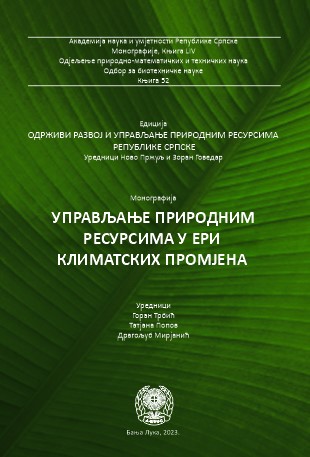Climate Change and Land Management
DOI:
https://doi.org/10.7251/EORU2308273SKeywords:
Land, climate change, soil degradation, erosion, irrigation, drainage, organic matterAbstract
The essential resources for the survival of the living world are air, water and land. By its essence land is the only non-renewable natural resource, with a potentially rapid rate of degradation and a very slow process of formation and regeneration. Water and land are resources, characterized by climate, so climate variability inevitably affects the processes in the land and its use, whose testimonies today we could find through the fossil lands. Processes affecting the lands are intensified in the last few decades around the world, such as erosion, water logging, drought, fire, loss of organic matter and the like, are associated with climate change and are visible on the territory of Republika Srpska. The basic task of humans today is to use the land rationally and to preserve it for new generations. On the basis of available measured data and climate models in the future, the following conclusions came out: land use would not be significantly impaired, nor would crop production be endangered; favorable climatic conditions would continue to prevail for the production of corn, wheat, and potatoes, with increased year-on-year variations by the end of the century; due to earlier sowing, water logging would be pronounced; regular maintenance of existing drainage systems should be fully in function, and new ones to be built in geopardize places; for the new, highly intensive orchard establishments and vegetable production, irrigation system should be designed and built; comprehensive solutions of existing erosion processes and prevention of occurrence of new ones should be envisaged, because in future climatic conditions, dry periods of higher intensity might occur, followed by strong rainstorms could cause permanent soil loss due to dried vegetation prone to erosion; considering that the soils of Republika Srpska are very poor in humus, i.e. organic carbon, it is necessary to apply agrotechnical measures to increase the intake of organic matter. Intentional burning of crop residues must be severely punished. Continuous monitoring of soil fertility on georeferenced locations is indispensable (pH, macroelements (NPK), content of organic matter, water-physical properties of soil) for better data comparison and observation of the direction of impact, whether positive or negative, in order to plan and take timely adaptation measures, ensuring proper and sustainable land use and climate change mitigation.
